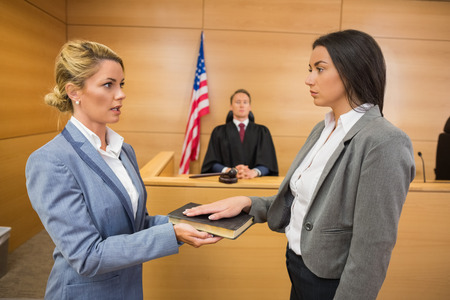
Criminal Trial Basics
Hollywood loves police and courtroom dramas. While they are undoubtedly riveting to watch sometimes, they leave the viewer with an unrealistic portrayal of the criminal justice system in general, and a criminal trial in particular. Therefore, before addressing the issue of a defendant’s testimony, it is important to first understand a few basics about a criminal trial. In any criminal prosecution, the State has the burden of proving that the defendant is guilty of the charges against him/her beyond a reasonable doubt. This is the highest burden of proof in the American justice system. Although there is no universally accepted definition of the term “beyond a reasonable doubt,” it is typically described as 99 percent sure that the defendant is guilty. This is a heavy burden for the prosecutor; however, the goal is to prevent innocent people from being convicted of a crime they did not commit.
Because the prosecution has the burden of proof in a criminal trial, the defense is not required to present any evidence or testimony. The State always presents its case first in a criminal trial. When the State rests, the defense has the option to present a defense — or not. This is a strategic decision. If the State’s case is very weak and based on nothing but circumstantial evidence, the defense may decide to do nothing and allow the judge or jury to render a verdict based solely on the State’s presentation. If, however, the defense does decide to present evidence, the defendant must decide whether to testify or not.
Why Might Testifying Be a Bad Idea?
It is your trial, your life, and your freedom on the line. Your primal instinct is to tell your story – to fight. Like most defendants, you are certain that you can convince the judge or jury that you are not guilty. Whether this is true or not, testifying might be the worst thing you can do.
One of the most important strategic decisions in a criminal trial for the defense is whether to put the defendant on the stand. Much thought often goes into this decision because there are a number of factors that must be considered. On the one hand, failing to put a defendant on the stand almost always raises questions in the minds of jurors. Although the judge will instruct the jurors that they cannot deduce guilt from the defendant’s silence, the reality is that some jurors will wonder why the defendant did not take the stand. In addition, in some cases, there are things that can only be explained by the defendant. An experienced criminal defense attorney can find creative ways to get many facts into evidence without the defendant’s testimony, but sometimes only the defendant can explain things such as why he/she said something during an interview or why he/she was in a specific place at a specific time. When that is the case, the benefit of putting a defendant on the stand may outweigh the potential harm.
On the other hand, putting the defendant on the stand exposes the defendant to cross-examination by the prosecuting attorney. Some witnesses cannot withstand cross-examination, even if they are completely innocent, because it can be grueling. Allowing the defendant to testify may also open the door to things the defense doesn’t want the jury to know, such as prior convictions the defendant has. Likewise, if the defendant made inconsistent statements in a prior interview, or makes an inconsistent statement on the stand, the defendant can appear evasive, unreliable, or deceptive – all things you don’t want the jury to think about the defendant. If you are the defendant, you may be certain this won’t happen to you; however, in a real-life trial, defendants often do themselves more harm than good when they take the stand.
Contact a Murfreesboro Criminal Attorney
If you are a defendant in a criminal prosecution, be sure you consult with a Murfreesboro criminal attorney at Bennett, Michael & Hornsby as soon as possible to ensure that your rights are protected. Contact the team today by calling 615-898-1560 to schedule your appointment.
- The Art of Successful Co-Parenting During Divorce - April 19, 2024
- Elder Financial Exploitation: How to Protect Seniors - April 12, 2024
- How to Obtain Guardianship of a Minor in Tennessee - April 2, 2024




